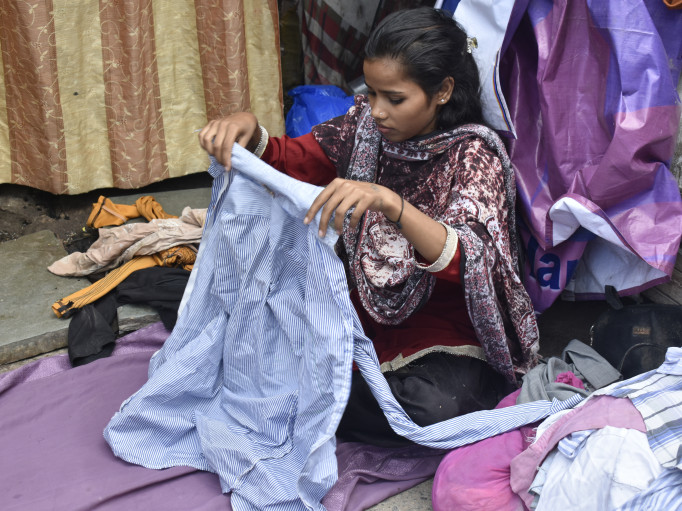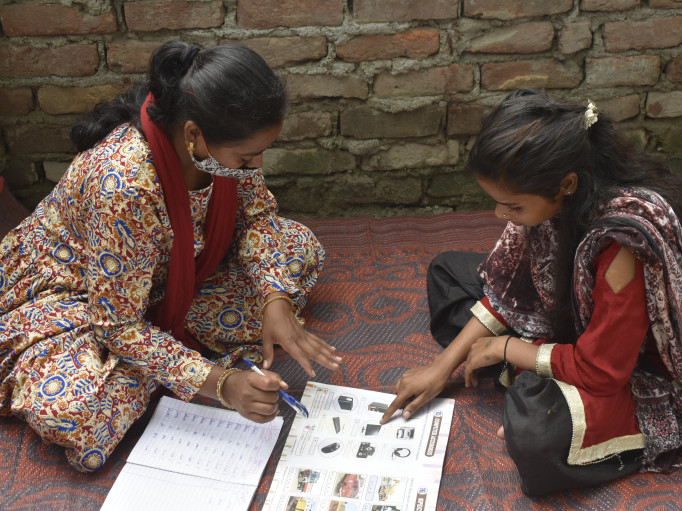“Sometimes we used to go to sleep on an empty stomach as there was no money to buy food – even thinking of buying sanitary towels was so far from reality and a completely impossible thing to do. When I got my period, I was using old clothes instead.” Savitri

For many in India, menstruation is still a taboo subject. This makes it incredibly difficult for young girls to access health and hygiene information when they start their periods. Savitri is one of these girls and this is her story.
Work and street children
At just 16 years old, Savitri has had to grow up quicker than many children her age. She lives with her mother and three younger siblings in a West Delhi shanty town, but the capital hasn’t always been their home. Financial difficulties meant they had to leave their small town in Uttar Pradesh to find opportunities which could better support the growing family.
Growing up, Savitri’s father was the main breadwinner, but the family was thrown into grief and uncertainty when he suddenly passed away through chronic illness, unable to access the treatment or care he needed to get better. The family unit was shattered as each member dealt with the loss in their own way. For Savitri’s brother, drugs became a way for him to escape his pain, and although her mother was also grieving, she knew she had to provide for her children. Despite all her efforts though, she just couldn’t earn enough to feed the children and so Savitri and her sister left school to join their mother in work. From being in school, Savitri was spending her days working in a clothing factory cutting off loose threads from garments.
One day in 2019, Toybox’s partner, CHETNA, met Savitri while she was working and recognised her great interest in learning and playing. Before long, she was a regular attendee at a project that encourages girls to learn through sport.

Period poverty and the pandemic
Then, the pandemic hit and life was turned upside down. A country-wide lockdown meant work was impossible and, like so many others, Savitri and her family struggled to survive. Having enough money to eat one meal a day was challenging enough, so when Savitri got her period, she knew there would be little spare change to buy sanitary products.
What causes period poverty?
“We were battling just to eat one meal a day to satisfy our hunger,” she says. “Sometimes we used to go to sleep on an empty stomach as there was no money to buy food – even thinking of buying sanitary towels was so far from reality and a completely impossible thing to do. When I got my period, I was using old clothes instead,” says Savitri, having learned to do this from her mother, who’d been doing this her whole life.
During the pandemic, personal hygiene at this time of the month was particularly difficult for Savitri because her house doesn’t have its own bathroom. Public toilets were the only place she could go but they were a 30-minute walk away; she had to hide an odd sanitary towel or old clothes under her top while walking there. Her mother also forbade her from going into any religious buildings or touching any religious items around her menstruation for fear of making it dirty.
Period poverty and myth busting
However, thanks to her involvement at the project, Savitri was able to receive support from CHETNA which provided her family with emergency relief to see them through the pandemic. Dry ration packs, sanitary products, and health and hygiene products helped Savitri stay safe and well as everyone stayed home. She was also able to learn more about period hygiene – now, her mother understands good hygiene practices during her period and Savitri has even taught her friends and sister the importance of using sanitary towels to avoid rashes and infections during menstruation. "Every girl should be educated about menstruation as it is a natural process that every girl has to go through. During these days it is important to maintain hygiene. Hence having education about periods is extremely important," says Savitri. Now when she’s on her period, Savitri’s life is a lot easier as she doesn't feel uncomfortable by having to use old clothes which cause infections.
Determination
Throughout all this, Savitri has maintained a love for studying and learning – she has passed Class 10 exams of her Open Basic Education and has learned so many life skills like leadership, effective communication, planning and teamwork – all of which she can take with her in the future. She dreams of being a teacher so that she can educate girls like herself. If she could change one thing in her community about the way period are viewed, she says, "I want my friends to know the importance of maintaining hygiene during their periods.”
Period poverty campaign
You can help to support street children living with the challenge of period poverty today, just £3 will gift a period pack to a child in India.
